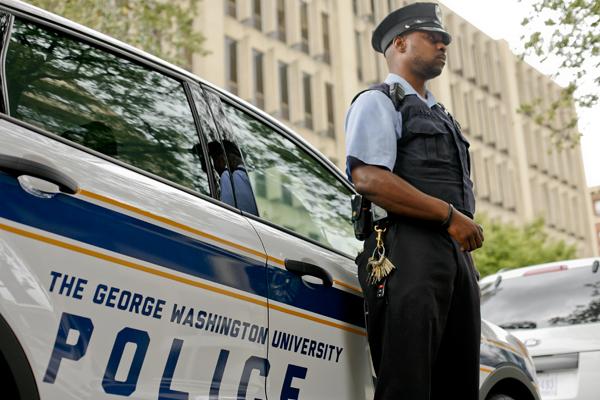Foggy Bottom’s more than 100 police officers patrol one of the safest areas in D.C., with the lowest rates of assault, rape and murder.
But over the last four years, more than two dozen police officers have been assaulted on the job, with incidents ranging from yelling, spitting and shoving to more severe attacks that land officers in the hospital, according to city and campus records.
University Police Department officers have been attacked 16 times in the past two years, UPD Chief Kevin Hay said Friday. In one of the most severe cases, an officer was chasing a suspect in April 2011 when the man pushed the officer into a metal pipe. The officer went to GW Hospital, where he received 21 stitches in his head, according to a report from the Metropolitan Police Department.
About half of the assaults on UPD officers involved intoxicated individuals, and students were the attackers in 37 percent of cases, Hay said.
“Any time people have had too much to drink, they can make a variety of bad decisions, and not listening to a police officer can be one of them,” Hay said, adding that intoxicated students are also sometimes aggressive and verbally abusive toward students who work for the ambulance service, EMeRG.
Seventeen officers reported their attacks to the Metropolitan Police Department over the last four years, according to information obtained through a Freedom of Information Act request. MPD recorded a total of 38 calls for assaults to officers during that time.
A former UPD officer, who was been assaulted multiple times, including once by a student, said he thinks many students underestimate the consequences of assaulting a UPD officer compared to a city officer.
“There’s a difference in the perception of authority between UPD and MPD, but inside a GW building or dorm room there really is no difference between an MPD officer and a UPD officer,” he said. “The one time I did get hit in the head, [the assailant] just didn’t get it until he was being carried away by five MPD officers.”
A man who had previously been barred from campus struck a UPD officer last month after police stopped him from entering the Smith Center. Another man spit on a different officer’s neck about one week later.
A current UPD officer, who spoke on the condition of anonymity because officers are not allowed to speak to the media, said it was unusual for a student to attack an officer, but drinking can make students more aggressive.

In September 2010, a student pushed and kicked UPD officers in the residence hall 2109 F St. after they responded to a disorderly conduct complaint. About a year later, a student in Strong Hall punched out a window and tried to hit an officer who was performing first aid. The student was sent to GW Hospital and later taken to the police station, according to police reports.
Last year, a student tried to knock down an officer who wouldn’t allow him to enter the crowded Spring Fling concert in University Yard. Officers pinned down the student and arrested him, according to a police report.
Assaults on police officers are ruled felonies when they create a “grave risk of causing significant bodily injury to the officer,” and can come with a maximum sentence of 10 years in jail and a fine of $10,000. A misdemeanor assault of an officer can have a sentence of up to six months in jail and a fine of up to $1,000.
Hay said officers avoid using force if they can, and receive training in a negotiation tactic called “verbal judo,” as well as self-defense techniques like using an expandable baton if a subject becomes more aggressive.
– Benjamin Kershner and Vanessa Bajko contributed reporting.
This post was updated March 3 at 3:55 p.m. to reflect the following correction:
Due to an editing error, The Hatchet incorrectly reported that students were perpetrators in 50 percent of assaults against campus police officers. That figure is 37 percent.








